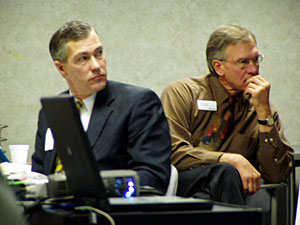|
Audio
Photos
Your Voice
|
State task force moving toward school funding reform plan
December 1, 2003
 |
| Task Force members Ric Dressen (left) and Duane Benson (right) listen to a consultant's report on education adequacy. (MPR Photo/Tim Pugmire) |
Roseville, Minn. — Gov. Tim Pawlenty selected 20 people last summer to study K-12 spending issues. He wants the group of educators and business leaders to find a way to replace the current per-pupil funding formula with a new system that's fair to all school districts, easy to understand and holds schools accountable for classroom results. Pawlenty's Education Commissioner, Cheri Pierson Yecke, says the governor wants to try some new and innovative approaches.
"We have one of the most complex funding formulas in the nation," Yecke said. "It needs to be simplified. It needs to be made equitable and fair. And so the governor wants to have some recommendations in time for the new legislative session. So that then the hope is the new formula can be piloted in certain districts."
Minnesota's current finance system provides schools a base funding amount of $4,600 per student. On top of that, the state provides money for special purposes, for low-income students and for those learning to speak English. Those earmarked funds can result in wide funding disparities among districts. The task force is getting help from three independent panels of professional educators to set a new baseline amount. Their research describes in detail what they consider the components of an essential education, including the type of instructional program and staff needed to meet the state's academic standards.
Judy Schaubach, president of the statewide teachers union Education Minnesota and a task force member, says the work is moving in the right direction.
 | |||
"I'm hopeful that it least gets us to a discussion of the right things instead of just talking about how many additional dollars we need," Schaubach said. "Talking about what we need to do in our public schools to make sure kids have and adequate opportunity to meet not just the standards but meet their potential, to be productive citizens."
The task force also hired a consulting firm to guide its education adequacy study. Management Analysis and Planning, Inc., has redesigned school finance systems in several states.
Alexandria Superintendent Ric Dressen, the task force co-chairman, says one reform option is to replace the current layers of funding for special needs with unrestricted block grants.
"I find myself in Alexandria sometimes where the funds are so compartmentalized that you can't work the way you need to do in an individual district," Dressen said. "So, sometimes if you can open those funds, use them a little more freely that you can meet your true educational objectives easier."
Representatives from various state education organizations are keeping a close eye on the governor's task force. There have been similar panels formed in recent years to try to simplify the state's complex K-12 funding system. The results have been limited.
Brad Lundell, executive director of Schools for Equity in Education, says he's optimistic this group can propose some meaningful recommendations.
"Hopefully the task force will come with something that's possible," Lundell said. "And I think that to the extent it's possible, the Legislature will be more interested in doing it. But still, the Legislature is going to have it's own ideas on things I'm sure." The education finance task force meets again this month to begin working on specific recommendations. Its report to the governor and Legislature is due by early February.
|
News Headlines
|
Related Subjects
|
